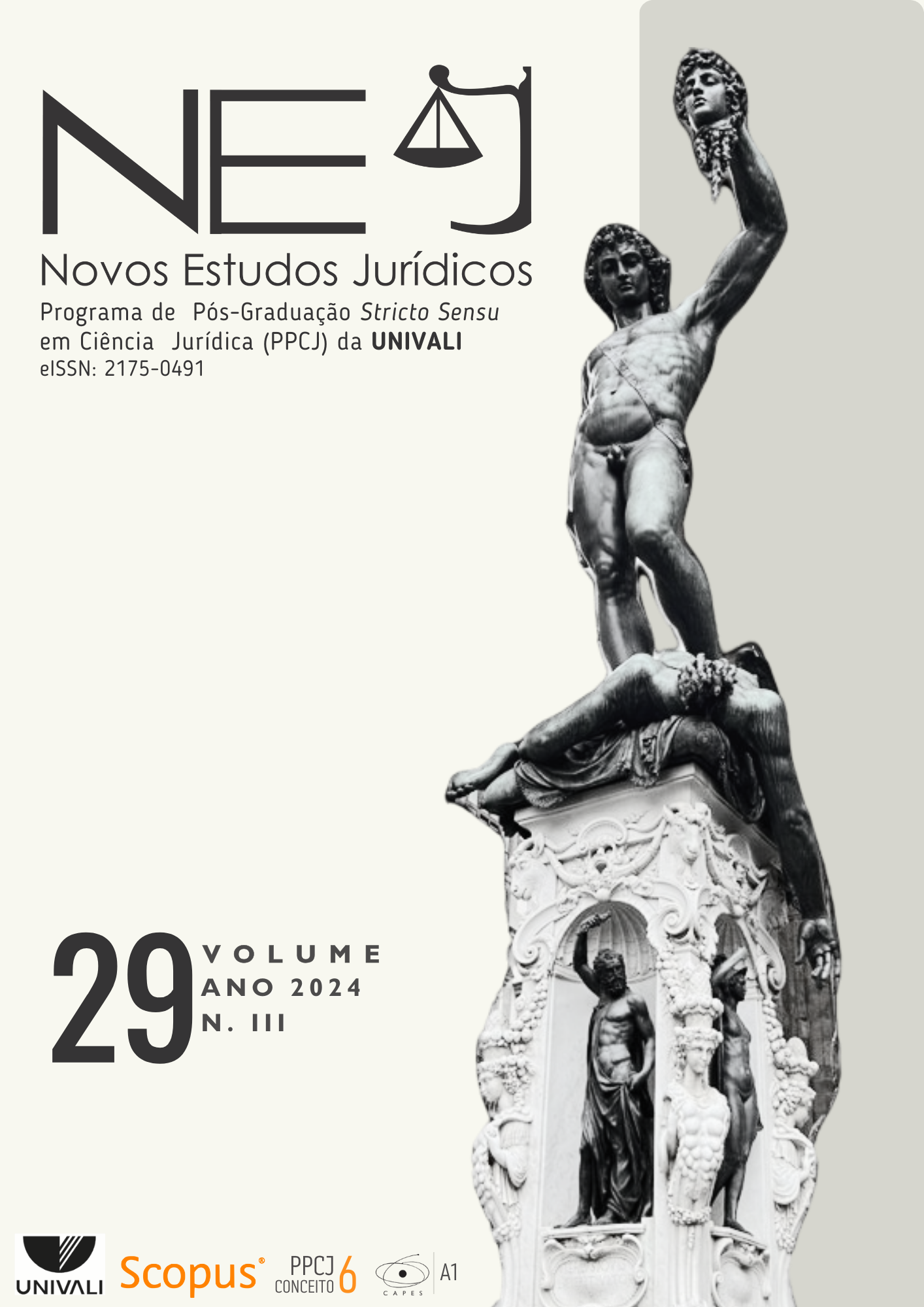EMPIRICISM AND LEGAL POSITIVISM
DOI:
https://doi.org/10.14210/nej.v29n3.p665-691Keywords:
Empiricism, Legal positivism, David HumeAbstract
Contextualization: Considering the conceptual obscurity surrounding the concept of "legal positivism," as well as the objections raised against this school of thought, this essay aims to investigate it from the perspective of the Philosophy that underpins it.
Objective: Specifically, the study examines, in David Hume's work, the essential characteristics that a theory must necessarily possess to be labeled positivist, structuring, based on Kolakowski's teachings, a set of four essential rules/criteria for this purpose. Once these criteria are established, it will be demonstrated how they integrate into legal positivism and how some dogmatic texts in Brazil treat positions that are precisely opposed to the concept of positivism as if they were positivism.
Method: The article employs the inductive method, using bibliographic review as the research technique to support the analysis of the topic.
Results: It is concluded that the concept of positivism remains confused in Brazilian doctrine because it has been reduced to meaningless expressions, and that positivism is criticized for positions that do not necessarily belong to it.
Downloads
References
AUSTIN, John. Lectures on jurisprudence. Nova York: Henry Holt and company, 1875.
BARROSO, Luís Roberto. Fundamentos teóricos e filosóficos do novo direito constitucional brasileiro (pós-modernidade, teoria crítica e pós-positivismo). Revista de Direito Administrativo, v. 225, p. 05–37, jul./set. 2001. DOI: https://doi.org/10.12660/rda.v225.2001.47562
BARROSO, Luís Roberto. Neoconstitucionalismo e constitucionalização do direito (o triunfo tardio do direito constitucional no Brasil). Revista de Direito Administrativo, v. 240, p. 01–42, abr./jun. 2005. DOI: https://doi.org/10.12660/rda.v240.2005.43618
BEEBEE, Helen. Hume on Causation. New York: Routledge, 2006. DOI: https://doi.org/10.4324/9780203966600
BENTHAM, Jeremy. An introduction to the principles of morals and legislation. Kitchener: Batoche Books, 2000.
BENTHAM, Jeremy. Chrestomathia. In: BOWRING, John. (Org.). The works of Jeremy Bentham. Edimburgo: William Tait, 1843.
BJARUP, Jes. Continental perspectives on natural law theory and legal positivism. In: GOLDING, Martin; EDMUNDSON, William (Org.). The Blackwell guide to the philosophy of law and legal theory. Oxford: Blackwell Publishing, 2005. DOI: https://doi.org/10.1002/9780470690116.ch20
BUCKLE, Stephen. Hume in the enlightenment tradition. In: RADCLIFFE, Elizabeth S. (Org.). A companion to Hume. Hong Kong: Graphicraft Limited, 2007. DOI: https://doi.org/10.1002/9780470696583.ch1
CARNAP, Rudolf. The unity of science. London: Kegan Paul, 1934.
COMTE, Auguste. A General View of Positivism. Cambridge: Cambridge University Press, 2009. DOI: https://doi.org/10.1017/CBO9780511692888
DIAS, Maria Berenice. Manual de direito das famílias. 14. ed. Salvador: Editora Juspodivm, 2021.
DWORKIN, Ronald. A justiça de toga. São Paulo: WMF Martins Fontes, 2010.
DWORKIN, Ronald. Taking Rights Seriously. Cambridge: Harvard University Press, 1977.
FARIAS, Cristiano Chaves de; ROSENVALD, Nelson. Curso de direito civil: parte geral e LINDB. 13. ed. São Paulo: Atlas, 2015. v. I.
FOEGELIN, Robert. J. Hume’s scepticism. In: NORTON, David Fate (Org.) The Cambridge companion to Hume. Cambridge: Cambridge University Press, 2005.
HART, Herbert L. A. O Conceito de Direito. 6. ed. Trad. de A. Ribeiro Mendes. Lisboa: Fundação Calouste Gulbenkian, 2011.
HUME, David. An Enquiry Concerning Human Understanding and Other Writings. Edited by Stephen Buckle. Cambridge: Cambridge University Press, 2007.
HUME, David. Tratado da Natureza Humana: uma tentativa de introduzir o método experimental de raciocínio nos assuntos morais. Trad. de Débora Danowski. 2. ed. São Paulo: Editora UNESP, 2009.
KELSEN, Hans. Teoria pura do direito. Trad. de João Baptista Machado. 8. ed. São Paulo: Editora WMF Martins Fontes, 2009.
KLEIN, Peter. Skepticism. In: ZALTA, Edward (Ed.). The Stanford encyclopedia of philosophy. Stanford: Metaphysics Research Lab, Stanford University, 2015. Disponível em: <https://plato.stanford.edu/archives/sum2015/entries/skepticism/>. Acesso em 11 fev. 2024.
KOLAKOWSKI, Leszek. The Alienation of Reason: A history of positivist though. New York: Doutileday & Company, Inc., 1968.
MARANHÃO, Juliano Souza de Albuquerque. Positivismo jurídico lógico-inclusivo. São Paulo: Marcial Pons, 2012.
NADER, Paulo. Curso de Direito Civil: parte geral. 11. ed. Forense: Rio de Janeiro, 2018.
NORTON, David Fate. An Introduction to Hume’s Thought. In: NORTON, David Fate (Org.) The Cambridge companion to Hume. Cambridge: Cambridge University Press, 2005.
OLIVEIRA, André Matos de Almeida; CARDOSO, Renato César. Quem tem medo da Guilhotina? Hume e Moore sobre a falácia naturalista. Analytica, v. 21, 2017, p. 147–182. DOI: https://doi.org/10.35920/arf.v21i2.22477
OLIVIER, André. Os limites da razão e um ceticismo mitigado. Revista do Instituto Humanitas Unisinos, São Leopoldo, v. 369, ago. 2011. Disponível em: http://www.ihuonline.unisinos.br/artigo/17-artigo-2011/3990-andre-luiz-olivier-da-silva-1?showall=&start=2. Acesso em 11 fev. 2024.
OLIVIER, André. Uma abordagem dos direitos humanos a partir de Hume e dos sentimentos morais. Natureza Humana (Online). v. 15, p. 94–115, 2013. DOI: https://doi.org/10.59539/2175-2834-v15n2-32
OLIVIER, André. Uma perspectiva cética quanto ao valor absoluto dos direitos humanos. Novos Estudos Jurídicos (online), v. 23, p. 278–302, jan./abr. 2018. DOI: https://doi.org/10.14210/nej.v23n1.p278-302
RACHLIN, Robert. Roland Freisler and the Volksgerichtshof: The court as an instrument of terror. In: STEINWEIS, Alan; RACHLIN, Robert (Ed.) The law in Nazi Germany: ideology, opportunism, and the perversion of justice. New York: Berghahn, 2013.
RADCLIFFE, Elizabeth S. Introduction. In: RADCLIFFE, Elizabeth S. (Org.). A companion to Hume. Hong Kong: Graphicraft Limited, 2007. DOI: https://doi.org/10.1002/9780470696583.ch
RAZ, Joseph. La autoridad del derecho: ensayos sobre derecho y moral. Trad. de Rolando Tamayo y Salmorán. México: Universdad nacional de méxico, 1985.
REIS, Thiago. Autonomia do Direito Privado ou política Codificada? O Código Civil de 1916 como projeto republicano. Revista do Instituto Histórico e Geográfico Brasileiro, v. 473, p. 273–326, jan./mar. 2017. DOI: https://doi.org/10.23927/issn.2526-1347.RIHGB.2017(473):273-326
REIS, Thiago. Dogmática e incerteza normativa: crítica ao substancialismo jurídico do direito civil-constitucional. Revista de Direito Civil Contemporâneo, v. 11, p. 213–238, abr./jun. 2017.
RODRIGUES JR., Otavio Luiz. Clóvis Beviláqua e o Código Civil de 1916 na visão de um estrangeiro: contradições com a imagem preponderante na historiografia nacional. Revista de Direito Civil Contemporâneo, v. 12, p. 35–61, 2017.
RODRIGUES JR., Otavio Luiz. Direito Civil contemporâneo: estatuto epistemológico, Constituição e direitos fundamentais. 3. ed. Rio de Janeiro: Forense Universitária, 2023.
ROSENBERG, Alexander. Hume and the philosophy of science. In: NORTON, David Fate (Org.) The Cambridge companion to Hume. Cambridge: Cambridge University Press, 2005. DOI: https://doi.org/10.4324/9780203087060
SARMENTO, Daniel. Direitos fundamentais e relações privadas. Rio de Janeiro: Lumen Juris, 2004.
SHAPIRO, Scott. Legality. Cambridge: The Belknap Press of Harvard University Press, 2011.
SOUZA, Eduardo Nunes de. Índices da aderência do intérprete à metodologia de Direito Civil-Constitucional. RFD — Revista da faculdade de direito da UERJ, v. 41, p. 01–41, p. 2022.
STRECK, Lenio Luiz. Dicionário de Hermenêutica: quarenta temas fundamentais da Teoria do Direito à luz da Crítica Hermenêutica do Direito. Belo Horizonte: Casa do Direito, 2017.
VALADÃO, Rodrigo Borges. Positivismo Jurídico e Nazismo: Formação, Refutação e Superação da Lenda do Positivismo. São Paulo: Contracorrente, 2022.
WALDRON, Jeremy. Law and disagreement. Oxford: Clarendon Press, 1999. DOI: https://doi.org/10.1093/acprof:oso/9780198262138.001.0001
WALUCHOW, Wilfrid. Inclusive legal positivism. Oxford: Clarendon Press, 1994. DOI: https://doi.org/10.1093/oso/9780198258124.001.0001
Downloads
Published
How to Cite
Issue
Section
License
Na qualidade de autor(es) da colaboração, original e inédita, sobre o qual me(nos) responsabilizo(amos) civil e penalmente pelo seu conteúdo, após ter lido as diretrizes para autores, concordado(amos) plenamente com as Políticas Editorias da Revista Novos Estudos Jurídicos - NEJ e autorizo(amos) a publicação na rede mundial de computadores (Internet), permitindo, também, que sua linguagem possa ser reformulada, caso seja necessário, sem que me(nos) seja devido qualquer pagamento a título de direitos autorais, podendo qualquer interessado acessá-lo e/ou reproduzi-lo mediante download, desde que a reprodução e/ou publicação obedeçam as normas da ABNT e tenham a finalidade exclusiva de uso por quem a consulta a título de divulgação da produção acadêmico científico.





























